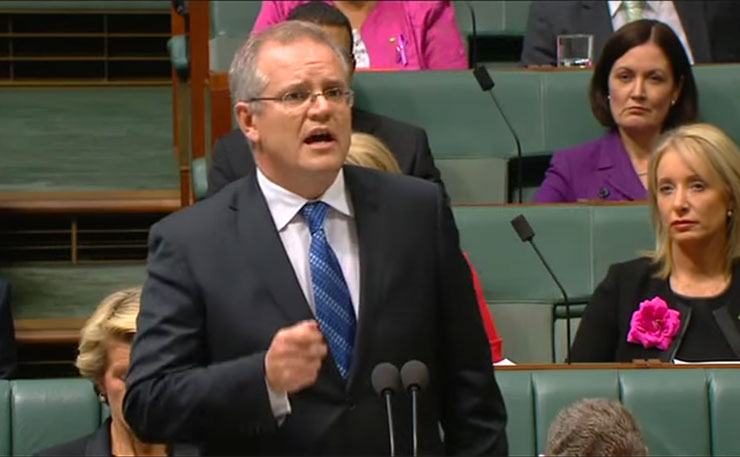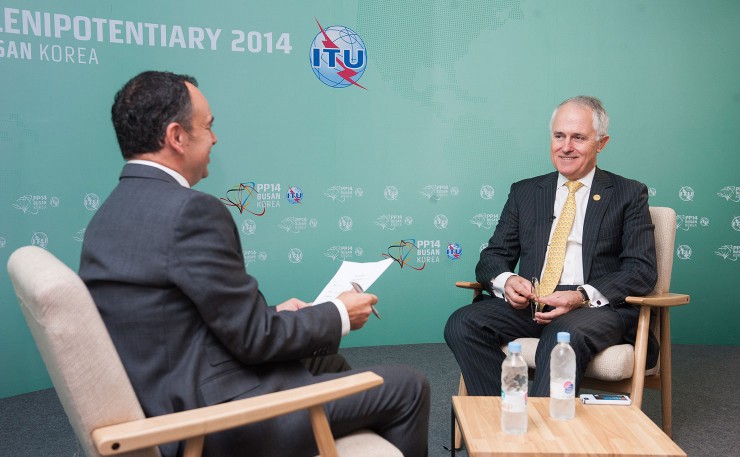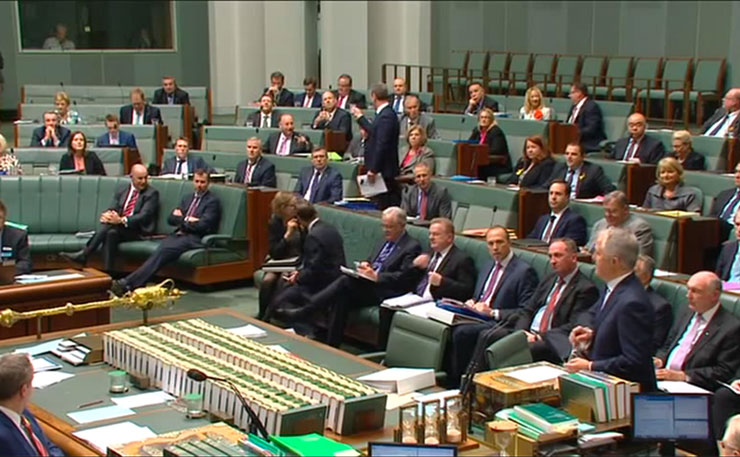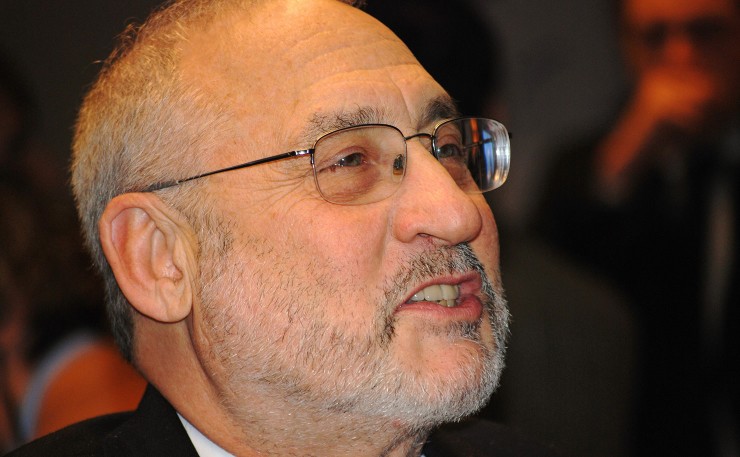Next week, Malcolm Turnbull will clock up six weeks as Prime Minister. So what’s changed? Has the direction changed, or are the messages just a little more polished. Psychologist and New Matilda columnist Dr Lissa Johnson delves into the ideology behind a government led by an ultra-wealthy former merchant banker.
What lies at the heart of a Turnbull Government agenda?
There have been mixed signals and mixed opinion, and striking similarities as well as differences to the Abbott leadership so far.
Our new PM began by wearing a new heart, humbled by experience, on the new leadership’s sleeve.
Gone was all reference to Team Australia and the Death Cult. Thank goodness for that.
There was even talk of partnership with Islamic leaders, albeit laced with a jibe to accept “Australian values” or leave, which sounded sadly familiar.
Nevertheless, we have more women in cabinet and a female Minister for Women. Our new PM even extended his hand to the women of Australia, saying the very things many women long to hear from the men in their lives.
I’ve learned from my mistakes… I need to listen more… I care what you think… I respect you.
The style of engagement was clearly more intelligent, measured and sophisticated.
Phew.
On the subject of intelligence, the PM intends to respect ours, men and women alike. He will consult, listen and deliberate before he acts. Amen to that.

Malcolm Turnbull has also said that he is an activist, but a thoughtful and considered one. He is telling us that he stands for something.
What?
In his first moments as leader he threw us a clue, which we converged upon like seagulls hungry for a scrap of certainty. His government would be ‘thoroughly liberal’.
Liberal in what way?
Progressive ‘small l’ liberal? Climate-change-is-a-moral-issue liberal? Or big L Liberal? We’ll-say-whatever-you-want-until-after-the-election Liberal?
Classical economic liberal? Laissez-faire free market liberal? Or neoliberal? Kill-or-be-killed-capitalism-on-steroids liberal?
Like Michaelia Cash’s our policies remain the same until they change, it could mean anything.
Given the gaping schism between Turnbull’s words and deeds on climate change, marriage equality, data retention and asylum seekers, it has been possible to project almost anything into the future of his leadership’s policies.
To the progressive optimist (and right wing pessimist), Turnbull’s inconsistencies reflect the bind of a ‘small l’ man in a ‘Big L’ party. There is the hope that he will bring the party towards the centre in time.
That hope, no doubt, at least partly explains Malcolm Turnbull’s 68 per cent approval as preferred PM compared to the Coalition’s 53 per cent, and his surge in popularity with women compared to Abbott.
But would a ‘small l’ leader have allowed the deportation of Abyan, a woman pregnant from being raped on Nauru, back to Nauru?
Having expressed his concern for people in offshore detention, Turnbull oversaw the return of an ill, frail, vulnerable, traumatised woman, pregnant as a result of rape, back to the lawless scene of her rape, even as she flees lawlessness and rape in her own country. This has variously been described as “grotesque”, “dark”, “inhumane” and “a complete disregard for… the rule of law”.
So much for respecting women.
Things are starting to feel even more sadly familiar.
Is Malcolm Turnbull secretly horrified by Abyan’s heartbreaking treatment? Are his hands politically tied? Does he feel tension between this travesty and his concern for asylum seekers and women?
Whatever the answers, one psychological quality that clearly does distinguish the Turnbull leadership from its predecessor is its tolerance for ambiguity and contradiction.
Psychologically, this reflects a change in what is known as the ‘need for cognitive closure’. Cognitive closure is a simplistic, black-and-white intolerance of uncertainty with a drive to prematurely “seize and freeze” on rigid and unshakeable opinions, based on little deliberation, self-reflection or evidence.
It was a hallmark of the Abbott Government.
Our new PM has been clear about his preference for precisely the opposite leadership style.
Need for cognitive closure is associated with old fashioned, fear driven, closed-minded authoritarian xenophobia, overt prejudice, hostility towards members of other social groups, and sexism. It probably also played a role in the Abbott Government’s undoing.
The overtly authoritarian style has a large fan base in the United States, partly because of the fundamentalist Christian right, but it didn’t wash with enough Australians to survive.
Hallelujah.
However, does the relief to be rid of an authoritarian leadership style make us vulnerable to whatever comes next? Are we so grateful for some cultivated courtliness, or so frustrated by what it hides, and so focussed on similarities and differences that we risk missing the point of the leadership change?
Malcolm Turnbull, the neoliberal?
In his press conference after the leadership spill, in his first words as PM, Malcolm Turnbull told us why he had taken the reins, and what he intends to stand for as leader.
His focus would be economic. He said that the country would “have now, an economic vision” and his government would be committed to “freedom, the individual and the market.”
Fair enough. Can’t argue with economic vision. Or freedom and individuals. Economies need markets. Just a three-word non-slogan really.
Except that this three-word non-slogan is the mantra of neoliberalism. Not ‘small l’ liberalism. It could equally apply to classical (laissez faire) economic liberalism, but no one does that anymore.
Really. Somalia, apparently, has the only truly laissez faire economy in the world.

Yes, neoliberalism gets bandied about fairly meaninglessly. It is hard to define, usually intended as an insult, rarely espoused by its proponents, and is practiced in one form or another by economies of all political persuasions and levels of prosperity across the globe.
But it is a “Planet-eating death star of political influence”. It is “kill-or-be-killed capitalism on steroids”, at least according to Matt Taibbi of Rolling Stone.
Distinguished professor of Anthropology and author of ‘A Brief History of Neoliberalism’, David Harvey, agrees, calling neoliberalism “The commodification of everything”, including human beings, which become ‘human capital’ under its rapacious capture. Capitalism gone wild.
Harvey adds that neoliberalism values ‘the market’ as “an ethic in itself, capable of acting as a guide to all human action, and substituting for all previously held ethical beliefs”.
Definitions differ, but they generally centre on the notion that neoliberalism is a political ideology rather than a bona fide economic theory, espousing markets free from government regulation (but not government money), small government with respect to civic investment, essential services and welfare (but not military and surveillance), in which individuals rather than the state are responsible for their own lot (corporations and multinationals are another story).
The influential cultural theorist and sociologist Stuart Hall defines neoliberalism as “grounded in the ‘free, possessive individual’, with the state cast as tyrannical and oppressive. The welfare state, in particular, is the arch-enemy of freedom. The state must never govern society, dictate to free individuals how to dispose of their private property, regulate a free-market economy or interfere with the God-given right to make profits and amass personal wealth”.
Despite differences across countries and time periods, commentators agree that neoliberal policies generally entail ‘free trade’ agreements (where trade is ‘freed’ from all manner of accountabilities, not just tariffs), privatisation of public assets, tax breaks to the wealthy, financial deregulation, weakening of workers’ entitlements and protections, scaling back the welfare state and reducing government investment in public amenities such as infrastructure, health and education.
After just several weeks, the Turnbull Government is ticking quite a few neoliberal boxes.
Two ‘free trade’ deals are poised to take effect. One, the Trans Pacific Partnership, frees multinational corporations from consumer and environmental protections, via freedom to sue governments, in tribunals free from sovereign law. It also provides new freedoms from corporate whistleblowers.
The other, the Chinese Australia Free Trade Agreement, is said to threaten Australian workforces, even after Labor’s safeguards, which have been described as a ‘hollow victory’ that ‘inadequately protects jobs’.
New treasurer Scott Morrison has presaged spending cuts from the get-go, endorsing Hockey’s notion that welfare fosters ‘entitlement’. No surprise, then, at the arrival of the ‘patronising’ and ‘undignified’ welfare card.

Morrison has also encouraged states to privatise health and other human and social services and schools.
Penalty rates are in the firing line and Australia’s coastal shipping trade faces deregulation, threatening thousands of jobs.
Tick, tick, tick and tick.
Neoliberalism is said to have taken hold in the 1980s and 1990s under Margaret Thatcher and Ronald Reagan. On one analysis its ascendancy involved applying classical laissez faire economic liberalism on a global scale, during which unbridled profit motives took over from the more traditional motive of exchange.
Somewhere along the way the notion of market ‘freedom’ became elastic, often referring to freedom from legal and regulatory constraints rather than government assistance and tariffs. Neoliberal governments often do provide assistance to very lucrative markets, such as the annual $11.5 billion in subsidies to fossil fuel industries in Australia, which 78 per cent of Australians would rather see spent on health and education. Or the trillions in bank bailouts in the US and the UK.
Neoliberal markets, then, like trade agreements, are not ‘free’ in the sense that is often assumed and implied.
Harvey adds that neoliberalism utlimately became “a political project to re-establish… the power of economic elites”.
In their book “Governomics” policy analysts Ian McCauley, New Matilda columnist and Lecturer in Public Sector Financial Management at the University of Canberra, and Miriam Lyons, executive director of the Center for Policy Development, note that “the political philosophy behind such thinking is variously described as neoliberalism, conservatism, or in Australia as economic rationalism, but these names are all misleading. It is not liberal in any traditional sense of the word, because it is pursued with the dogmatic assurance of a fundamentalist preacher”.
Like other fundamentalisms, neoliberalism’s ideology has become so divorced from reality as to resemble insanity.
There is widespread agreement among economists and policy experts that neoliberalism makes no economic sense in terms of economic prosperity, and has proved itself a spectacular economic failure all over the world.
Nobel Laureate economist Joseph Stiglitz, for instance, wrote in 2008, “For a quarter-century, there has been a contest among developing countries, and the losers are clear: countries that pursued neo-liberal policies… lost the growth sweepstakes… Neo-liberal market fundamentalism was always a political doctrine serving certain interests. It was never supported by economic theory. Nor, it should now be clear, is it supported by historical experience.”
The same is true of more prosperous economies. McCauley and Lyons flesh this out in Governomics, showing that among high-income OECD nations, countries with high taxes and well-funded public services also have strong economic growth, stronger than countries with more neoliberal policies such as the US and the UK.
They note, “There is well documented research, across a number of countries (including Australia) and over more than 100 years, which strongly suggests that well-directed government spending improves economic performance”.
Richard Denniss, Chief Economist at The Australia Institute, adds, “Virtually every economist would agree that, in the long run, investment in education is the best way to boost productivity, labour-force participation and GDP growth”.

As well as a poor growth record, neoliberalism is credited with the global rise in wealth and income inequality since the 1980s, of which Australia is a part, including devastating outcomes in developing countries indebted to the IMF, the abysmal poverty rates and low wages in the United States, and crippling austerity in the UK and the Eurozone, which economist Paul Krugman notes is not supported by established (or heterodox) economic theory or modelling.
He says, “the austerians have been making up new stuff and/or rediscovering old fallacies to justify the policies they want”.
At the risk of stating the obvious, Stiglitz observes, “Rather than wealth trickling down, it rapidly found its way to the pinnacle of the pyramid”. He explains in his book ‘The Price of Inequality’ that, far from boosting economic performance, government spending cuts, ‘small government’, lower taxes and market deregulation destroy both demand and jobs.
Harvey explains this in terms of neoliberalism’s upward wealth redistribution through “accumulation by dispossession”, rather than productive wealth-creation, involving dispossession of rights such as environmental protection rights and “conversion of various forms of property rights (common, collective, state, etc.) into exclusive private property rights… appropriation of assets (including natural resources)… the diminution or erasure of various forms of common rights (such as state pensions, paid vacations, and access to education and health care)” and so on.
Given the profitability of offshore detention, war and private prisons, one could add human rights to that list.
Economist Michael Hudson agrees, noting that “the greatest fortunes of our time have come from privatizing the public domain”.
Mining giant Adani obviously realizes this.
The Turnbull Government’s recent re-approval for the Adani Carmichael mega mine, with increased ‘freedom’ from Government oversight, is accumulation by dispossession of the most heinous sort. If the mine goes ahead it will involve the dispossession of the Wangan and Jagalingou people of their land and cultural heritage, the world of the Great Barrier Reef as we know it, and all living species of a habitable climate.
Needless to say, this and other neoliberal projects under Turnbull were in train before he came to power, having been instigated under Abbott.
But that is the point. The Abbott leadership couldn’t sell the neoliberal agenda. They kept putting people off.
Enter Malcolm Turnbull.
Turnbull’s close ally in the spill, and fellow Goldman Sachs alumnus Arthur Sinodinos, told Radio National that the Abbott Government’s main failing of economic management had been an inability to ‘till the ground’ sufficiently for the Coalition’s economic agenda. The other failing had been trying to do ‘too much too fast’ in the first budget.

In other words, the economic content was good, it was the delivery that was lacking.
As the remedy, Turnbull is presumably here to till the ground, smooth the way, soften us up and bring us around, sowing the more noxious neoliberal seeds, such as university deregulation perhaps, more gradually.
On the topic of university deregulation Sinodinos said, “unless we have an internationally competitive [neoliberal buzzword]outward looking [ditto]university sector that can attract students from around the world with quality offerings [buzz again], it’s not going to have a great future. And that does raise issues about the contribution the public sector makes towards the funding of higher education.”
Hint – he’s not angling to give universities more money.
Some tilling going on. And a few university deregulation seeds thrown in for good measure.
Given the inversions of truth that neoliberalism entails, it does require quite some selling.
Hall says of “free markets” and their “invisible hand”, “Actual markets do not work that way. They do not work mysteriously by themselves, or ‘clear’ at their optimum point… No ‘hidden hand’ guarantees the common good.”
Sociologist Neil Davidson adds, “one would have to be extraordinarily naïve to believe that the neoliberal project has been about establishing ‘free’ markets in the first place”. (Think corporate welfare, bank bailouts, fossil fuel subsidies, tax havens, wars to secure oil and gas interests and markets for the military-industrial complex).
As Joseph Stiglitz frequently points out, given the ugliness of its reality, neoliberalism needs myths to survive. He cites as examples the myth of the American Dream, the myth of opportunity, the myth that those at the top earned their wealth, and the myth of trickle down economics, among others.
Underlying all of these is the myth of ‘neoliberal economics’. Neoliberalism is agenda and ideology dressed up as economics.
In a very accessible Monthly article on the subject, Richard Denniss unpacks “the myth of Coalition economic management”. Denniss debunks Coalition rhetoric on the economy, which he says is couched in “econospeak”. Econospeak, he explains, is used when selling specious economic policy, to “confound and confuse. Especially when it’s politicians talking about economics”.
Psychologists would agree. Research indicates that when presented with confusing and impenetrable socio-political information, people tend to switch off, avoid the subject, and place their faith in leaders to sort things out.
Abbott and Hockey weren’t too good at eliciting such trusting disengagement. They didn’t do “econospeak” very well. It needs to sound complicated. They were more “Team Australia” and “Poor-people-don’t-have-cars” kinds of guys.
Wordsmith Malcolm Turnbull, however, is the Coalition’s man.
Malcolm Turnbull, the economic salesman
An article in the Sydney Morning Herald noted that as a former Goldman Sachs chair and partner, Turnbull is particularly well suited to this task. A fellow ex-Goldman Sachs executive pointed out that senior banking executives such as Malcolm Turnbull (and Sinodinos) are particularly adept at selling change. Not to mention financial products.
Former chief of staff to John Howard, Graheme Morris, added that the Coalition felt that Malcolm Turnbull would be better than his predecessor at presenting the Coalition’s economic agenda ‘to mums and dads’ in a way that would garner their support.
Turnbull himself said that he would like to emulate the New Zealand Prime Minister and former head of currency trading at Merrill Lynch, John Key, who has successfully persuaded the New Zealand public to sell off billions of dollars of public assets. Turnbull observed that Key had achieved this by “respecting their intelligence”.
Aaaah. So that’s why he respects us. And our intelligence.

The Sydney Morning Herald also noted that “former executives from Goldman Sachs, Merrill Lynch and Deutsche Bank hold the top three political leadership posts in Australia and New Zealand”. NSW premier Mike Baird, a former Deutsche Bank executive, “successfully argued the merits of the controversial planned $20 billion selloff of the state’s electricity network in the face of union opposition and won re-election earlier this year”.
Accumulation by dispossession again. Good for short term hits to the government books. Not so good for long term economic prosperity, according to economists.
More importantly, all these bankers heading up government is starting to sound familiar.
In his rolling stone article ‘The Great American Bubble Machine’ Matt Taibbi documented in detail the dizzyingly crowded and busy revolving door between Goldman Sachs and the US government, before, during and after the global financial crisis.
He said “any attempt to construct a narrative around all the former Goldmanites in influential positions quickly becomes an absurd and pointless exercise, like trying to make a list of everything”.
He also famously called Goldman Sachs “a great vampire squid wrapped around the face of humanity, relentlessly jamming its blood funnel into anything that smells like money”.
He was, of course, referring to the extended predatory bender of “pump and dump scams” involving concocted and inflated financial products and markets, made possible by neoliberal banking deregulation (‘freedom’) in the US, and the revolving door between government and banking.
This revolving door, like that between government and mining, is an issue that goes to the heart of democracy. It is central to the demise of democracy noted by many, and recently empirically documented in the US by professors of politics and political science Martin Gilens and Benjamin Page.
Gilens and Page demonstrated what many had long claimed: that US government policies overwhelmingly represent the interests of economic elites, such as financial and fossil fuel industries, rather than those of the majority of citizens.
In tandem with this, representatives of these very industries increasingly advise and constitute government, as Professor of Public Policy at Berkely and former US Labour Secretary, Robert Reich, explains in his latest book ‘Saving Capitalism’, where he expands upon the perils of linking wealth and power, and the ‘false distraction’ of the ‘free market’.
In this context, the fact that Australia now has a former Goldman Sachs chairman as PM is noteworthy. Not for any fear of his representing the direct interests of Goldman Sachs. But because of the implications for democracy and economic management.

Globally, part of the move away from democracy and towards economic elite domination has involved transfer of economic policy from economists (who understand the economy) to bankers (who understand how to get rich).
Upward redistribution of wealth is a banker’s area of expertise. It is also the neoliberal project.
But how does ‘capitalism on steroids’ square with Malcolm Turnbull’s socially progressive side? Where does Malcolm in the middle fit in?
In terms of the structure of ideological beliefs, social and economic attitudes are dissociable to a certain extent. It is possible to be economically conservative without being particularly socially conservative, overtly at least.
In the psychological literature, economic conservatism involves a preference for economically-driven social hierarchies and inequalities, and endorsement of essentially neoliberal preferences such as limited government, opposition to redistributive policies, pro-business attitudes and so-on.
This anti-egalitarian economic motive, however, is not necessarily anchored in a closed-minded fear of difference, as is overt authoritarianism. Hence it is not necessarily intrinsically hostile towards others on cultural, gender or religious grounds, as we saw under Abbott.
Cultural diversity, to the economic conservative, is fine. What matters is that a person is of merit. That the hand of the market has anointed them worthy.
Such a world view is associated with what is known as ‘system justifying’ and ‘meritocratic’ beliefs, or the mindset that social and economic systems (in this case the market) are fair and just, and that people generally get what they deserve in life.
If you listen for it, Treasurer Scott Morrison’s language is peppered with themes of meritocracy. There is ‘reward for effort’ (hard work leads to success), “some people find it more beneficial to stay on welfare” (the unemployed are lazy), the government’s imperative to remove “welfare traps” (the unemployed are lazy and undeserving) and so-on. Even Turnbull’s “some of us are fortunate in the intellect we inherit from our parents” is meritocracy couched in a nod to luck.
This meritocracy mantra not only reflects the leadership’s ideology, but is an important psychological tool in shaping the public’s receptiveness to neoliberal philosophies (tilling the ground).
When a person’s meritocratic belief system is activated (“people get what they deserve in life” “hard work leads to success”) they become motivated to defend their meritocratic beliefs, rendering them uncritical and even resistant to contradictory evidence.
In research, for instance, once meritocratic beliefs are primed, people view exactly the same research as more rigorous and convincing when it supports a pro- rather than anti-meritocratic conclusion. They also work harder on ‘system-relevant’ tasks, or tasks that are framed as symbolic of the notion that hard work leads to success, even when told that success depends on luck.
Repeating a mantra of merit and deservingness, then, is likely to keep the public primed, bolstering their faith in the hand of the market, their willingness to work for it, and their resistance to contrary evidence or information.
Interestingly, ‘fair market beliefs’, or faith in the justice of the ‘invisible hand’, correlates with self-deceptive tendencies.
Who would have thought that belief in a big, bounteous, invisible hand was delusional?

Meritocratic susceptibility serves a range of psychological functions, such as maintaining hope, motivation and persistence. It also reduces guilt and empathic pain over others’ suffering, through victim-blaming, which partly explains its relationship to stereotyping and prejudice.
Although meritocratic ideologies are not necessarily associated with fear-driven hostility towards members of other social and cultural groups, they are associated with various psychological measures of prejudice and discrimination. This includes ‘Social Dominance Orientation’, which is a ruthless (rather than fearful), kill-or-be-killed preference for social hierarchies, where the biggest, strongest and best man or woman comes out on top.
This may partly psychologically explain the controlling, oppressive, totalitarian overtones of neoliberalism observed by some, including Noam Chomsky, such as militarization, surveillance and attacks on freedom of speech and civil liberties.
At the very least, the dark side of the meritocratic mindset fails to give genuine credence to structural inequality and disadvantage, as well as privilege and luck, in the fortunes of the market’s ‘winners’ and ‘losers’.
Not to mention the ruthlessness of the market itself. That big dispossessing hand can deliver some big backhanders.
The real impact of neoliberalism
As the economic ravages of neoliberalism have become increasingly evident, social and psychological scientists have begun examining its impact in other spheres.
An active area of this research concerns psychological wellbeing. Numerous studies, for instance, have found a positive relationship between welfare spending and the subjective wellbeing of populations.
In a recent review and extension of this literature, political scientist Patrick Flavin and his colleagues examined a range of government activities in the market, and their relationship to life satisfaction across OECD nations for the period 1981 to 2007.
They looked at government consumption (eg spending on education, health, roads etc), welfare spending, ease of access to welfare, and labour market regulation (wages, conditions, employment protection etc). They found that, “As the degree of government intervention into the market economy increases, individuals’ subjective well-being increases”. This applied across all levels of income, “rich and poor alike”.
Strikingly, Flavin and colleagues found that two of their measures – ease of access to welfare and labour market regulation – had a larger effect on wellbeing than being married or employed.
They concluded that the psychological impact of a government’s balance between the market and the state was “profound”.
In his book “The Loss of Happiness in Market Democracies” Yale Professor Emeritus of Political Science, Robert Lane, makes the case that the growing influence of the market economy has been raising levels of population depression, and decreasing wellbeing, across industrialised nations.
He attributes this to the ascension of materialism at the expense of relationships and social bonds.
Suicide rates have also been linked to pro-market economies. A study comparing suicide rates across US states for the period 1990-2000 found that “states with higher per capita spending [welfare; education, training and assistance; health benefits and family benefits] tend to have lower suicide rates, and that the relationship is dramatic in terms of its substantive impact”.
The authors noted that states with more a progressive balance between market and government saved significant numbers of lives annually. They calculated that an annual per-capita increase in spending of just $45 in the US would reduce the national annual suicide rate by 10 per cent.
Stiglitz has observed, “Much of what has gone on can only be described by the words ‘moral deprivation’” and, “too little has been written about the underlying ‘moral deficit’ that has been exposed [by the]unrelenting pursuit of profits and the elevation of the pursuit of self-interest”.

In addition to more suicides and depression, numerous studies show that smaller welfare states create various other forms of ‘immiseration’ including poorer physical health, lower self-esteem, alcoholism and domestic violence.
One way for our Government to get serious about domestic violence, then, would be to heed the advice of economists on a responsible spending/revenue mix. For instance, The Australia Institute paper, ‘It’s the Revenue, Stupid’ details a path out of the current budget deficit through progressive taxation rather than spending cuts.
The paper notes that this makes most sense, given that the majority of the budget deficit (70 per cent) comes from revenue shortfall.
Interestingly, in one study of tax attitudes, people expressed greater support for progressive taxation when inequality was framed in terms of the wealth of the wealthiest rather than the poverty of the poorest. It seems that framing extreme wealth as a social issue, not just poverty, may resonate with many people.
Perhaps this is one reason the Turnbull Government is helping the wealthiest to keep their financial arrangements secret. Passing legislation that shields companies with annual revenues of over $100 million from tax transparency says a lot about the Government’s priorities. And its take on ‘freedom’, ‘individuals’ and ‘markets’.
In this case, freedom is for wealthy individuals to keep their tax arrangements to themselves. And possibly offshore. So stuff the market.
Conclusion
So was it just talk, all those progressive things that Malcolm said? All those eloquent things about women, climate change, marriage equality and our freedom to remember and forget, unsurveilled?
He might have meant it at the time. But attitudes and behaviour are often out of step. Only strong preferences reliably predict behaviour.
Malcolm Turnbull expressed his leadership’s strong preferences in a three-word non-slogan on day one – “Freedom, the individual and the market”.
No matter how culturally open-minded its proponents, a 21st century ‘free’ market inevitably creates social hierarchies and underclasses, through dispossession not merit.
The end result is the same as good old fashioned conservatism, possibly starker. Social stratification and ossification, perpetuation of privilege, and the demise of mobility and opportunity.
Trusting the Turnbull leadership and ‘the market’ to defy this global reality is laudably optimistic.
Through my psychological lens, however, it looks unrealistically optimistic.
My money is on the death star.
I’ll be glad if I’m wrong.
Donate To New Matilda
New Matilda is a small, independent media outlet. We survive through reader contributions, and never losing a lawsuit. If you got something from this article, giving something back helps us to continue speaking truth to power. Every little bit counts.





